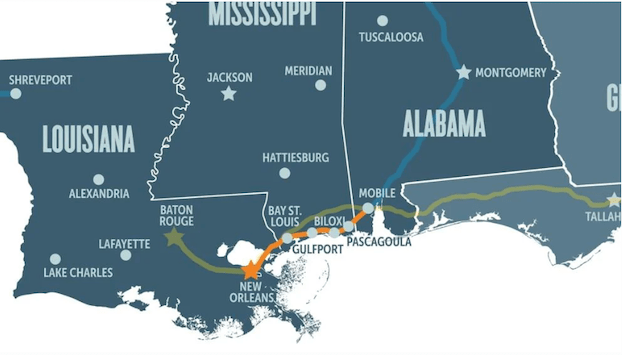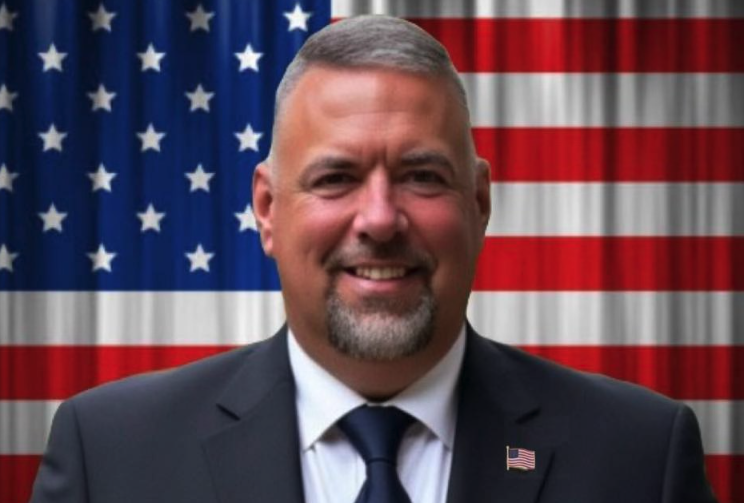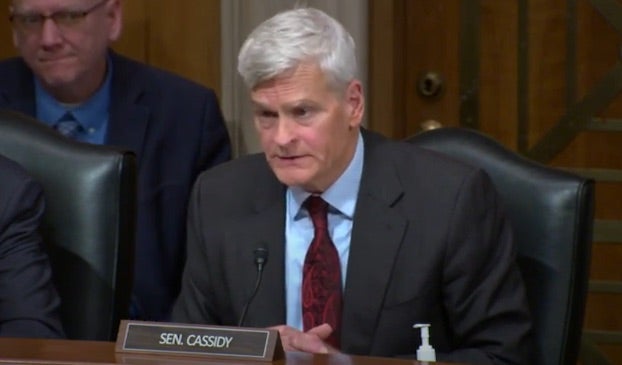Gulf Coast Amtrak route to start on Aug. 18, cost $15 per trip
Published 12:44 pm Wednesday, July 2, 2025

- Map shows Amtrak route from Mobile to New Orleans. (Photo courtesy of the Southern Rail Commission)
By Steve Wilson | The Center Square
Amtrak announced on Tuesday it will start new, twice-daily service connecting Mobile, Ala., with New Orleans on Aug. 18 and cost $15 per ticket, one way.
The Amtrak Mardi Gras Service will offer four trips daily with stops in Pascagoula, Biloxi, Gulfport and Bay Saint Louis in Mississippi.
Trending
Knox Ross is the chairman of the Southern Rail Commission, which played a key role in helping to bring the service back, coincidentally, on the 20th anniversary of Hurricane Katrina’s landfall.
Amtrak service on the Gulf Coast ceased after Katrina in 2005 amid declining ridership and damage to track infrastructure.
He told The Center Square that the commission isn’t concerned about the possibility of the three entities – the states of Louisiana and Mississippi and the city of Mobile – possibly pulling their funding and whether that would mark the end of the service as it did 20 years before.
“There’s a lot of different ways you can go past that, but I mean, we’re not concentrating on that right now,” Ross said. “We’re concentrating on making a successful service that everybody’s going to want to participate in going forward.”
He also said that profitability isn’t a concern for the service.
“There’s no contrivance that carries people that is profitable, airlines, if you include it in all air traffic controllers, TSA, all of the FAA money goes into it’s not really,” the former Pelahatchie, Miss., mayor said. “What you have to look at any transportation venue is it valued, what is bringing to you? It’s like a highway. What’s that bringing to you? So it is bringing people that wouldn’t come here and will also bring people who will leave here because they can easily get around. That’s how you have to look at it.”
Trending
According to a news release by Amtrak, adult coach fares will start at $15 for a one-way ticket, with costs lower for shorter distances and higher for coach class and for peak times. Discounts will be offered for children up to age 12, students, seniors, veterans and military personnel.
According to Amtrak, the trains will offer coach and business class and cafe service with menus featuring locally-sourced items. The rail carrier also said the trains will have reclining seats with ample legroom, no middle seats, free Wi-Fi, and generous carry-on baggage allowances, with golf bags and pets in carriers accepted.
Newly sworn-in Gulfport Mayor Hugh Keating said the trains will bring new visitors to downtown, helping restaurants, the Mississippi Aquarium and TrainTastic, the city’s model train museum that is one of the nation’s largest.
“I remember riding the rails to New Orleans several times in the early years and just prior to Katrina and what a great, beautiful ride and experience that is,” Keating said. “Walking down on this historic brick road into downtown Gulfport and looking and saying, ‘wow, this is cool. There’s a lot going on here’ and there’s going to be much more going on.”
Service was supposed to start in spring, but delays derailed the effort.
Whether the service, which requires subsidies from the city of Mobile, Mississippi and Louisiana to continue, will be self-sustaining is unknown. According to Amtrak’s five-year plan from 2021, it predicts the Mardi Gras Service will lose $8.2 million in its first year with ridership of 24,300 annually.
At $15 per ticket, ridership numbers that low would generate only $364,500 in annual revenue.
According to the Amtrak 2015 feasibility study for restoration of Gulf Coast rail service, total trips declined 45.2% from 148,387 in fiscal 1993 to 81,348 in 2005. The study blamed reliability issues and delays with the trains, plus the loss of taxpayer funding from the three states.
Mississippi has already committed about $15 million in state taxpayer money to the project, with Louisiana adding $10 million and $3 million coming from the city of Mobile.
A federal $178 million Consolidated Rail Infrastructure and Safety Improvements Program grant announced in 2022 is already helping to improve trackage and other infrastructure needed to restore service to the coast.





